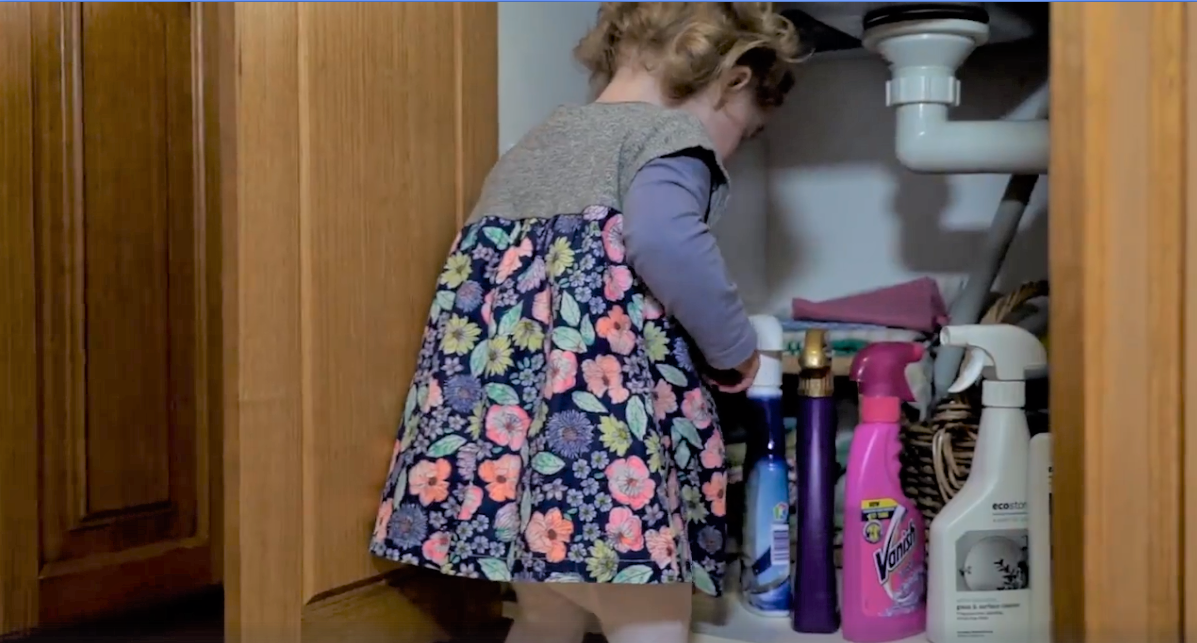
22 Victorian Children Treated in Hospital Due to Poisoning Every Week
Kidsafe Victoria is urging parents and carers to conduct an audit and put in place strategies to restrict children’s access to potentially poisonous products stored under their kitchen, laundry and bathroom sinks.
The call comes as statistics from the Victorian Injury Surveillance Unit show that in 2018/19, 1,174 Victorian children aged 0-14 years were treated in hospital due to poisoning (334 hospital admissions and 827 ED presentations) – approximately 22 per week.
Thousands more Victorian children are exposed to poisonous substances each year. In 2018 alone, the Victorian Poisons Information Centre received 18,427 calls – approximately 50 per day – relating to the exposure of a poisonous substance involving children aged 0-14 years. The large majority of these calls (86%) were for incidents involving children aged 0-4 years.
Kidsafe Victoria General Manager, Jason Chambers, said that toddlers were at increased risk of poisoning due to their natural curiosity and lack of awareness of danger.
“Toddlers explore their world by putting things in their mouths, however they don’t yet understand the difference between what is safe and dangerous. They are often attracted to the bright colours, fruity scents and similarities between the look of some poisonous products and lollies, which increases their risk of poisoning ”, said Mr Chambers.
Common substances involved in childhood poisoning include over the counter medicines such as Paracetamol and Ibuprofen, prescription medications including those for blood pressure and diabetes, and household cleaners such as detergents, hand sanitisers, bleach and toilet cleaners.
Dr Cathy McAdam, Head of General Paediatrics at Monash Children’s Hospital, said that poisoning symptoms can depend on a number of factors, including which product is involved and how much
the child has been exposed to. “Symptoms of poisoning may include drooling, vomiting, unexpected drowsiness and abdominal pain. If you think a child has ingested a poisonous substance, it’s important that you don’t wait for
late symptoms to occur – ring the Poisons Information Centre immediately on 13 11 26.
Prevention is best, so regularly check that potential poisons are locked away”, said Dr McAdam. Many child poisoning incidents occur when products are left unattended and in places that are easily accessible, which is why Kidsafe Victoria recommends that all poisonous products are stored out of the sight and reach of children, at least 1.5 metres off the ground, in a lockable cupboard.
“It’s important to remember that child resistant containers are not child proof. They are designed to be difficult for children to open, but not impossible, which means that these products still need to be stored in a safe place”, said Mr Chambers.
As well as household cupboards, Kidsafe Victoria is also encouraging parents and carers to check other areas of the home, including outside in sheds or garages where poisonous materials such as pool chemicals, fuel, paints, solvents and pesticides are commonly stored.
What to do if you think your child has ingested a poisonous substance:
- • Never try to induce vomiting.
- • Phone the Poisons Information Centre on 13 11 26 (24 hours a day, 7 days a week Australia
wide). They will advise you of what to do next. - • Have the product container with you when you call, as the Poisons Information Centre will
want to know what ingredients are listed in the product. - • If the patient has collapsed, stopped breathing, is fitting or is suffering an anaphylactic
reaction, ring 000 for an ambulance.
For more information please visit https://www.kidsafevic.com.au/home-safety/poisoning/
Media Enquiries:
Jason Chambers, General Manager, Kidsafe Victoria – Mobile: 0431 447 982

